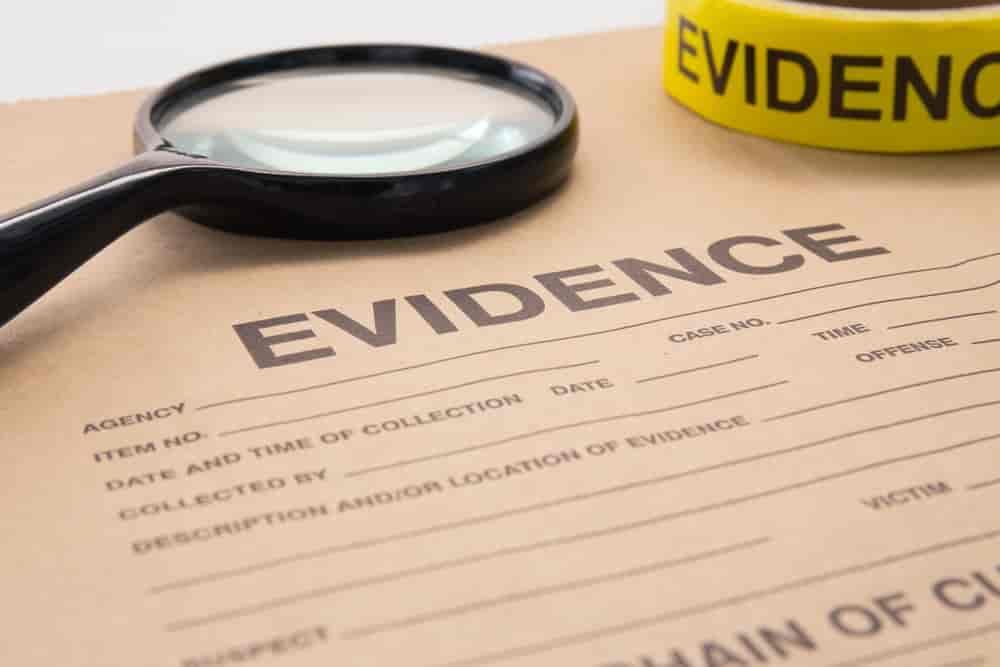What is Evidence?
Evidence comes from the English word “evidence” and means “proof,” “basis,” or “supporting evidence” in Japanese.

Specifically, it refers to the following:
- Objective data and facts: statistical data, survey results, experimental results, literature, product specifications, internal documents, etc.
- Expert opinions and evaluations: diagnoses from doctors, opinions from lawyers, analyses from consultants, evaluations from rating agencies, etc.
- Past experiences and achievements: successful cases in similar past cases, results of customer satisfaction surveys, verification results of product safety, etc.
It’s important that evidence is based on objective facts and data rather than subjective opinions or speculations. It’s also crucial that it comes from reliable sources.
Evidence is useful in various situations. For example, it can be helpful in the following scenarios:
- Making one’s opinions or proposals more persuasive: Evidence can be used in presentations, meetings, and proposals to make one’s opinions or proposals more convincing.
- Making better decisions: Evidence can be used by bosses and managers to make better decisions.
- Reducing risks: Before making decisions involving risks, such as entering new businesses or investment decisions, evidence can be used to analyze risks.
- Improving customer satisfaction: By accurately understanding customer needs and providing evidence-based products and services, customer satisfaction can be improved.
- Building competitive advantage: Presenting differentiated evidence based on unique research and analysis can differentiate one from competitors.
In business scenes, evidence plays an increasingly important role. Acquiring, analyzing, and properly utilizing evidence skills are becoming increasingly crucial in modern industries.
Different Meanings of Evidence in Different Industries
The word “evidence” is widely used in the business scene to mean “basis,” “evidence,” or “supporting evidence.” However, nuances and importance may vary slightly depending on the industry.

- Consulting Industry:
- When proposing solutions to clients’ problems, objective data and analysis results serve as evidence.
- Past records and successful cases in similar cases are also convincing evidence.
- Using unique research results and analysis methods can present more differentiated evidence.
- Financial Industry:
- In investment decisions or lending decisions, objective information such as financial statements and credit rating information is emphasized as evidence.
- Past market trends and economic indicators also serve as important bases for decision-making.
- Proper management of evidence is required from the perspectives of legal compliance and risk management.
- Marketing Industry:
- Data based on consumer surveys and market research are considered evidence in the development of new products or services and advertising.
- Analysis results of customer behavior and social media also contribute to effective policy formulation.
- Using experimental results like A/B tests can provide more objective evidence.
- Manufacturing Industry:
- Evidence such as test results and inspection data is utilized in product development and quality management.
- Evidence-based decision-making is also important in process management and supply chain management.
- The importance of evidence is increasing in response to international standards and certification systems.
The Importance of Evidence for Businessman

In business scenes, evidence plays important roles such as decision-making, persuasion, risk management, improving customer satisfaction, and building competitive advantage.
- Increasing Persuasiveness and Credibility:
- Showing objective evidence for one’s opinions or proposals increases persuasiveness and credibility.
- Especially when persuading clients or superiors or passing internal proposals, the importance of evidence is high.
- Improving Decision Making:
- Making decisions based on data allows for more logical and rational judgments.
- Analyzing past successful and unsuccessful cases allows for more effective policy-making.
- Reducing Risks:
- Conducting sufficient investigations and analyses beforehand and taking evidence-based measures can reduce risks.
- Especially in entering new businesses or making investment decisions, careful risk analysis is essential.
- Enhancing Customer Satisfaction:
- Accurately understanding customer needs and providing evidence-based products and services can improve customer satisfaction.
- Analyzing results of customer satisfaction surveys or NPS surveys can identify customer issues and improvement points.
- Building Competitive Advantage:
- Presenting differentiated evidence based on unique research and analysis can differentiate one from competitors.
- Incorporating the latest technology and trends can build a stronger competitive advantage.
In conclusion, evidence plays crucial roles in decision-making, persuasion, risk management, customer satisfaction improvement, and competitive advantage building in business. Acquiring, analyzing, and properly utilizing evidence skills are becoming increasingly important for businesspeople. And, summarization skills might be necessary too.
Efficient and accurate real-time translator tools to improve your work — Felo Translator

What is Felo Translator ?
Felo Translator is an AI simultaneous interpretation app equipped with GPT-4 engine and RRT technology. Quickly and accurately translate audio from over 15 foreign languages including English, Spanish, French, German, Russian, Chinese, Arabic, and Japanese. Supports downloading of original and translated texts to help you learn accurate expressions and pronunciation. As a large-scale language model, ChatGPT accurately conveys the passion, expression, and dramatic effect of the stage, allowing audiences to fully understand and enjoy the excitement brought by different linguistic cultures.\
How can Felo Translator assist simultaneous interpreters?
Felo Translator supports beginners in simultaneous interpretation and solves problems by leaving no notes behind and more accurately translating technical terms.
Simultaneous interpretation is a complex and highly technical task, requiring interpreters to have solid language skills, a wealth of specialized knowledge, and a good sense of teamwork. Only continuous learning and improvement of one’s translation skills can make one qualified for this important translation task and contribute to the smooth progress of international communication.
iOS Download | Android Download

